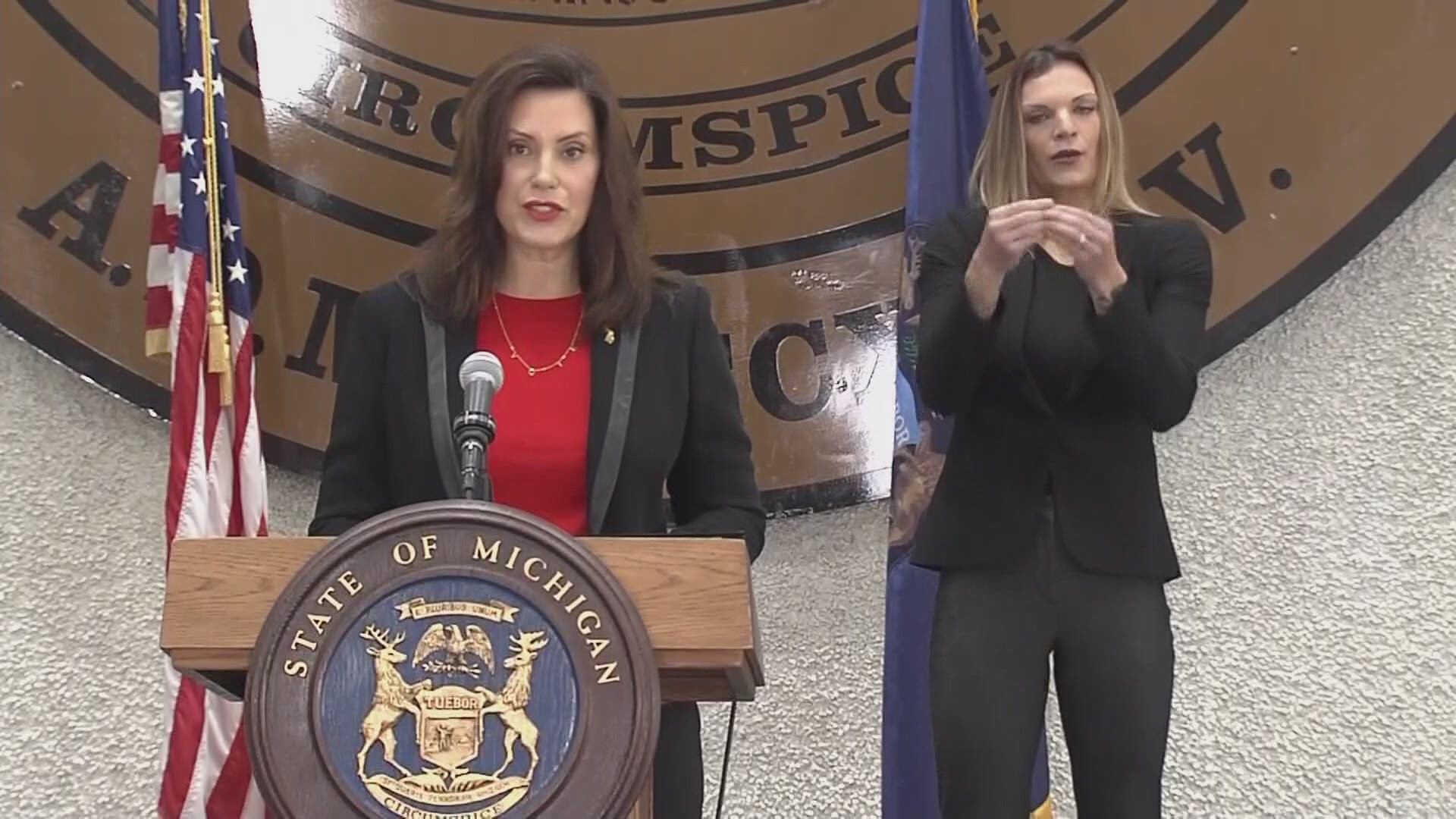DETROIT — On Monday, Gov. Gretchen Whitmer signed House Bills 4980-4985 and 5120 reforming Michigan’s criminal expungement laws. Now, it's much easier for people who have committed certain felonies and misdemeanors to have their record expunged.
Changes in the bills include allowing a person to set aside one or more marijuana offenses if the offense would not have been a crime if committed after Dec. 6, 2018 when recreational marijuana use by adults became legal in the state, according to a press release from the governor's office.
“This is a historic day in Michigan. These bipartisan bills are a game changer for people who are seeking opportunities for employment, housing, and more, and they will help ensure a clean slate for hundreds of thousands of Michiganders,” Gov. Whitmer said Monday. “This is also an opportunity to grow our workforce and expand access to job training and education for so many people. I am proud to sign these bills today alongside Lt. Gov. Gilchrist and many of the bipartisan leaders who worked on them.”
Research conducted by the University of Michigan law school, which was recently published by the Harvard Law Review, found that people who receive expungements see a 23% increase in income within a year, leading to more resources for families and communities, and a broader tax base, without any negative impact on public safety.
“This anti-poverty, pro-job opportunity Clean Slate legislation will reinvigorate the economic potential of hundreds of thousands of Michiganders whose records have hindered their availability to get a job or secure housing, and it will help us grow our workforce,” Lt. Gov. Garlin Gilchrist said. “This is the right thing to do on behalf of people everywhere who deserve another chance, and will help improve livelihoods. There is more work to do, but Michigan has now established itself as a leader in removing barriers to economic opportunity for people who have made mistakes. I will continue to stand tall for Michiganders across the state who need someone in their corner.”
The changes proposed by House Bills 4980-4985 and 5120 include the following:
- Creates an automatic process for setting aside eligible misdemeanors after seven years and eligible non-assaultive felonies after 10 years.
- Expands the number and revises the types of felonies and misdemeanors eligible to be set aside by application.
- Revises the waiting periods before being eligible to apply.
- Treat multiple felonies or misdemeanor offenses arising from the same transaction as a single felony or misdemeanor conviction, provided the offenses happened within 24 hours of one another and are not assaultive crimes, or involves possession or use of a dangerous weapon, or is a crime that carries penalty of 10 or more years in prison.
- Expands expungement eligibility to various traffic offenses
- Allow a person to petition to set aside one or more marijuana offenses if the offense would not have been a crime if committed after the use of recreational marijuana by adults became legal in the state.
The law goes into effect April 2021.
"What we can do is see the people in our communities who are privately and secretly living with these barriers opened up to all these new opportunities," said Denavvia Mojet, the executive director for the Black and Brown Cannabis Guild. "Especially in a pandemic, this is a real equitable need, because people are already struggling."
The Black and Brown Cannabis Guild is a group that supports those in West Michigan to expunge certain marijuana convictions. Mojet called today's signing "tremendous and historical." During National Expungement Week last month, which The Guild hosted events to help the cause, more than 500 people inquired about the process. The bill allowing automated expungement of certain convictions will especially help many who have never thought to seek expungement before.
"Recent studies have shown here in Michigan, that even under the current statute, people who were eligible for expungement weren't navigating the process," said Mojet, "They didn't know how to go about getting the hearing, the fingerprinting, the background checks, and then making their case to a judge saying, 'Hey, this happened a long time ago, and I'd like to have it removed.'"
Mojet feels this is a great step in the right direction, but still more needs to be done for criminal justice reform. For one, she believes there should be more awareness and education for processes like expungement.
"We should really reevaluate some of the things that we're calling misdemeanors, or evaluate some things that we're calling felonies," said Mojet. "We should really be looking at the way people are racking up these convictions, that compound into a point where they just have this rap sheet. And these are just regular moms in our community, dads in our communities, who just had a bad night or did something silly. Then 10 to 15 years later, and it's still there."
Watch the full press conference here.
►Make it easy to keep up to date with more stories like this. Download the 13 ON YOUR SIDE app now.
Have a news tip? Email news@13onyourside.com, visit our Facebook page or Twitter. Subscribe to our YouTube channel.

